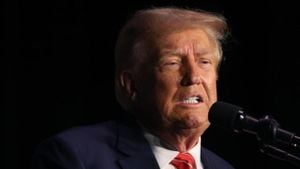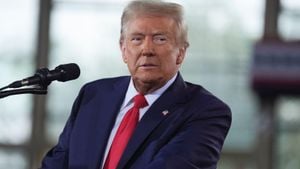President Joe Biden made history on November 17, 2024, by becoming the first sitting U.S. president to visit the Amazon rainforest. This landmark trip, which took him to Manaus, Brazil, is framed within his broader agenda to combat climate change, especially as the upcoming G20 summit looms near with environmental issues taking center stage.
The Amazon, often referred to as the "lungs of the planet," is not just the largest tropical rainforest but also plays a significant role in absorbing carbon dioxide, one of the key greenhouse gases contributing to climate change. Yet, it faces extreme threats from deforestation and wildfires. This year, it has experienced some of the worst fires recorded, exacerbated by drought conditions attributed to climate change.
During his visit, Biden is expected to meet local and Indigenous leaders to discuss environmental issues, emphasizing the need for global cooperation to protect this invaluable ecosystem. His administration has recently increased funding for climate initiatives, successfully raising U.S. climate financial commitments to over $11 billion annually, significantly higher than the $1.5 billion when he first took office.
Notably, the Biden administration announced additional contributions to the Amazon Fund, which aims to mitigate deforestation. On this trip, the president will also inaugurate November 17 as International Conservation Day, drawing attention to the urgent need for biodiversity protection and environmental stewardship.
“It’s significant for a sitting president to visit the Amazon. This shows a personal commitment from the president,” commented Suely Araújo, former head of Brazil's environmental agency. Yet, there is skepticism about whether anything substantial will come from Biden's visit, considering Donald Trump's incoming administration. Trump has previously dismissed climate change as a "hoax" and has pledged to pull the U.S. from international agreements aimed at tackling environmental concerns.
Reflecting on Biden’s foreign affairs maneuvers, his visit to Brazil follows his attendance at the Asia-Pacific Economic Cooperation (APEC) summit, where he met with international leaders, including China's Xi Jinping. This backdrop sets the stage for discussions on international climate policy as the world awaits the impending involvement of Trump, who has plans to rollback numerous climate initiatives established under Biden.
Experts argue this historic visit could represent one last effort to bolster climate action before potential setbacks under the new administration. Biden's trip to the Amazon is about more than just being the first president to set foot there; it's about reigniting global discussions on the importance of rainforests not only for the environment but also for indigenous cultures and biodiversity.
Biden's aerial tour of the Amazon will not only visually capture the region's vastness and beauty but will also highlight the urgent challenges it faces, including illegal deforestation and resource exploitation.
Brazil's President Luiz Ignacio Lula da Silva is fervently seeking international support to preserve the Amazon during what many view as a precarious time. With leaders like Trump returning to power, environmentalists warn of potential reversals of progress made over the last few years. Trump’s history of prioritizing fossil fuels and downgrading the importance of climate action could encourage other nations to follow suit, undermining decades of international efforts to preserve natural ecosystems.
Adding to the urgency, the Amazon rainforest comprises 10 percent of the world's known biodiversity and regulates moisture across South America. The fight against climate change may look bleak against the backdrop of political shifts, yet Biden's declarations and this historic tour aim to lay down markers for the continued commitment of the U.S. to environmental issues.
President Biden's administration maintains hope for environmental progress, aiming for binding commitments from nations attending the G20 summit to back initiatives to combat climate change effectively. His visit to the Amazon isn’t merely symbolic; it is also part of larger efforts to stimulate international collaboration for sustainability—an action more necessary than ever.
The before-and-after stories of the Amazon are stark and serve as powerful reminders of what is at stake. The world now watches intently as Biden emboldens climate advocacy on his terms, even as political winds shift and uncertainty grows.
With this pivotal trip to the Amazon, Biden steps boldly onto the global stage, leaving his mark and sending out a clarion call for international cooperation. His challenge is making lasting impact amid the swirling tides of political change. Time will tell if the momentum he seeks to build will withstand the challenges posed by the new administration and offset any backslide on the environmental progress made under his leadership.



